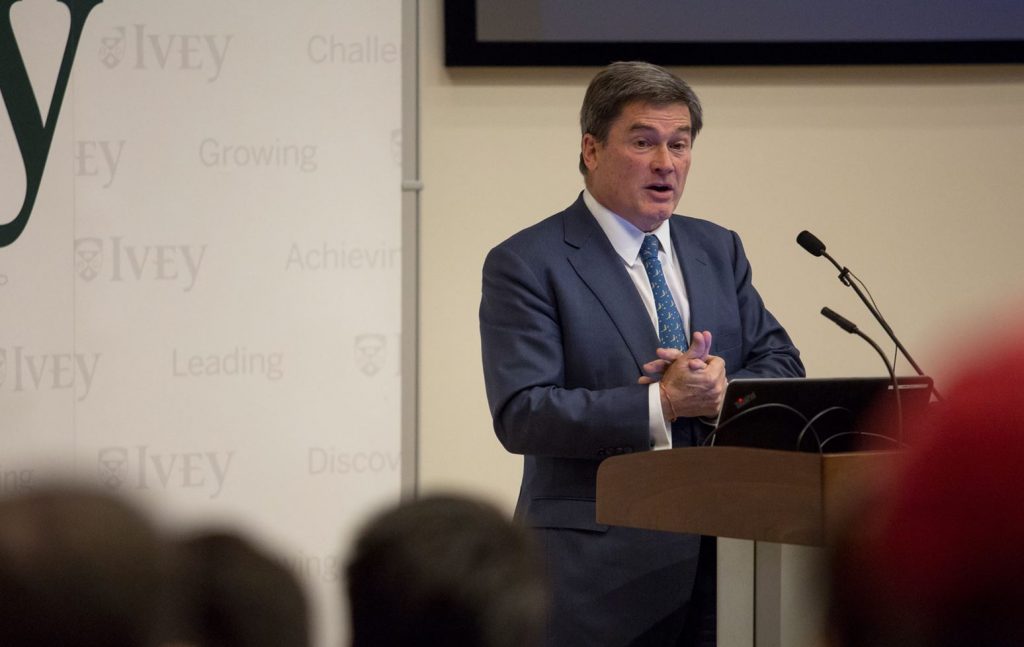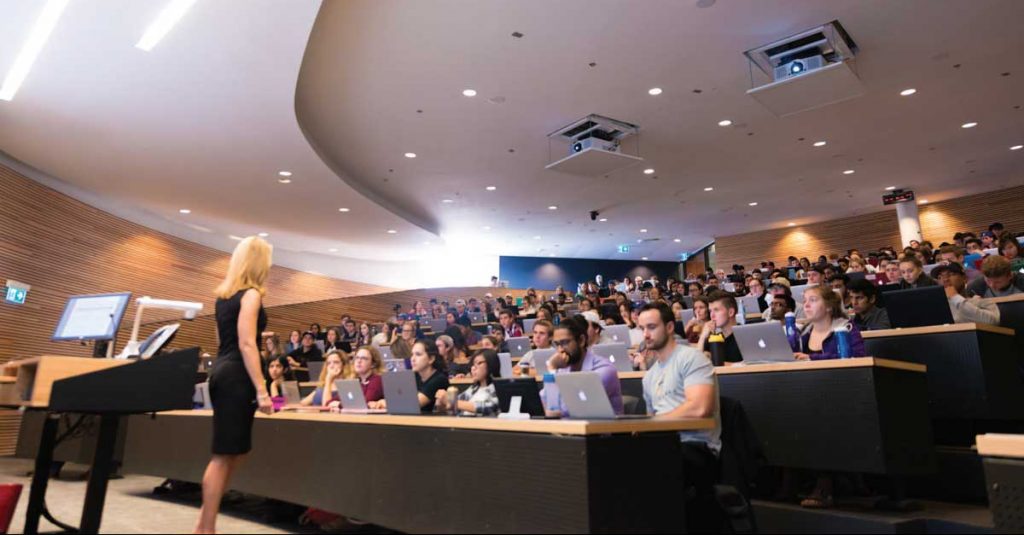Will Canadian Customers Adapt to the “Basic” Airline Standard? – Toronto News

Catch up on all the exciting Toronto business schools new from the past week below.
Air Canada, WestJet Offer Cheap Basic Economy Fares for No-Frill Seekers – CBC/Radio-Canada
CBC News sought the expertise of airline analyst and York University Schulich School of Business professor Fred Lazar for an article that examined the intricacies of “basic economy” fares. Though these fares, which offer cheaper seating and even fewer benefits than standard economy, have been popular in the United States, they have only recently been adopted by AirCanada and WestJet.
Though the thought of a cheap flight is tantalizing, basic economy definitely has its drawbacks. Passengers who take advantage of the cheap fares will not earn points (Aeroplan miles or Westjet dollars) with the airlines, cannot change their flights, are ineligible for refunds, and cannot upgrade their seats.
Though some predict the limiting and cost-effective option will see backlash from dissatisfied passengers, Lazar predicts Canadian travelers will adapt quickly to the no-frills travel option.
“Just like when [airlines] started charging for food, charging for blankets, pillows, there were complaints. You rarely get them nowadays,” Lazar said.
Learn more about Canadian airlines’ “basic economy” option here.
Why Students Make Their Ideas Commercial Faster – Forbes
This week, a Forbes article about student entrepreneurs featured a paper authored by three experts, including University of Toronto’s Rotman School of Management professor Joshua Gans. The book, “Control Versus Execution: Endogenous Appropriability and Entrepreneurial Strategy,” whose other authors include Kenny Ching of University College and Scott Stern of MIT Sloan, explored entrepreneurship in technological innovation.
The researchers looked at the successes of student-led and faculty-led entrepreneurial endeavors and found that students prioritize bringing an idea to fruition quickly, rather than obtaining intellectual property assets. Forbes used the findings in the paper to suggest that student entrepreneurs are more successful due to their emphasis on speed over caution.
“Our analysis suggests that student entrepreneurs, with less time and with less access to university intellectual property institutions, are more likely to choose an execution-oriented strategy. Compared to University faculty, who are more likely to be patient, wait for delayed market entry and pursue a control-oriented strategy with formal protection.” – Kenny Ching
Learn more about why student entrepreneurs are often successful here.
New Course Explores Intersection of Business and Community – McMaster’s Brighter World Daily News
First year students in the Integrated Business and Humanities (IBH) program at McMaster University’s Degroote School of Business have been traveling to downtown Hamilton to attend a weekly class at CityLAB. CityLAB is a hub that allows students from community institutions (McMaster University, Redeemer University College, and Mohawk College) to collaborate with municipal staff and engage with the community to tackle pressing projects and issues.

Integrated Business and Humanities meet at the CityLAB space / Photo via dailynews.mcmaster.ca
“It’s a totally new way of learning,” said IBH student Yael Morris. “We’re finding out how we can apply social innovation not just to business, but to our everyday lives so we can build relationships and interact with people in our communities.”
The class, IBH 1AD3 allows students to gain a new perspective on challenges facing their community, and to tackle these challenges from a business perspective. IBH was a collaboration between that Business and Humanities faculties aimed at producing industry leaders apt to address societal issues such as sustainability and business ethics.
“Through a combination of instruction, community-based guest speakers, field trips and projects, students have been learning about the concepts that underpin community engagement and social innovation, as well as about social enterprise and the business models used by community organizations.”
Read more about McMaster’s CityLAB course here.
Rotman Receives $6 Million Endowment, and More – Toronto News

This week, some of Toronto’s most prominent business schools have seen a wealth of exciting news (including actual wealth in Rotman’s case, in the form of a sizeable donation). We’ve rounded up some of the most exciting recent news from Toronto metro’s business schools.
Private Donations Give Specialty Programs a Shot in the Arm – The Globe and Mail
Over 20 years since the University of Toronto received a $15 million donation from the Rotman family, changing its name from the Faculty of Management to the current Rotman School of Management, the philanthropic family once again returned a sizable gift to the Toronto business school.
The new $6 million donation will boost the school’s healthcare management programs, according to the Globe and Mail. As well, the family gifted the school an additional $1 million to help “the reach of an award-winning program for Indigenous entrepreneurs.”
“The latest Rotman family donation is earmarked for three initiatives: recruitment of three faculty research chairs in artificial intelligence, life sciences commercialization and health economics and policy; scholarships for graduate students in health care management studies; and support for a new global executive MBA for health care and life sciences.”
You can learn more about the Rotmans’ donation here.
Schulich Researchers Analyze Canada’s Multicultural Marketplace – yFile
A new York University Schulich School of Business study from professors Ela Veresiu and Markus Giesler—“Beyond Acculturation: Multiculturalism and the Institutional Shaping of an Ethnic Consumer Subject”—found that “that Canada’s market-based form of multiculturalism fosters marketplace inclusion without resource redistribution, and maintains ethnic divides rather than uniting diverse communities.”
“We bring sociological theories of neoliberal governmentality and multiculturalism to bear on an in-depth analysis of the contemporary Canadian marketplace to reveal our concept of market-mediated multiculturation, which we define as an institutional mechanism for attenuating ethnic group conflicts through which immigrant-receiving cultures fetishize strangers and their strangeness in their commodification of differences, and the existence of inequalities between ethnicities is occluded,” said Veresiu.
You can read more about Veresiu and Giesler’s study here.
Investing Insights: Lessons from Tom Russo – Ivey Blog
Last month, Tom Russo, managing member of Pennsylvania investment firm Gardner Russo & Gardner, spoke with professor George Athanassakos’ value investing class at the Ivey Business School about his company’s investment philosophy, which broke down into three principles.

Gardner Russo & Gardner managing member Tom Russo / Photo via ivey.uwo.ca
- The capacity to invest
- The capacity to suffer
- The capacity do nothing
“Despite the long-term unattractiveness of holding cash, doing nothing may sometimes prove to be the right decision to make,” HBA and Computer Science dual degree candidate Leroi Yu writes on the Ivey Business School blog. Sitting on the sidelines instead of compromising on quality takes character. It provides optionality and may prove to be beneficial in the long-run.”
You can read more about Russo’s advice here.
Toronto Playoff Success Is Good For Business, and More – Toronto News

Playoff Fever for Leafs, Raptors Fans – CityNews Toronto
With the NBA and NHL playoffs about to begin, Schulich School of Business sports marketing professor Nitish Bissonauth talked about the underlying financial positives of repeated playoff appearances. Which is pretty good news for the Toronto Raptors and Maple Leafs.
Watch the video below, via CityNews Toronto.
Golf and Tennis Executive Raises His Game After Earning MBA – The Globe & Mail
David Main, the general manager at the Toronto Lawn Tennis Club, has held senior management positions at various Ontario golf and tennis clubs for the past 10 years. He credits his MBA education from Western University Canada’s Ivey Business School with giving him the tools he needed to thrive in this field. Due to Main’s use of his MBA education to pursue a career in the golf and tennis industry, The Globe And Mail featured him in its most recent addition to a series on graduates utilizing their MBAs in non-traditional fields.
“Mr. Main says he started his MBA at 34 and was part of a small group of students at Wilfrid Laurier University in Waterloo, Ont., who were about 10 years older than the rest of the class. He felt comfortable enough in the room – and more comfortable than the year prior, when he took a few undergrad business classes to brush up on basic concepts alongside 18 and 19-year-olds—until he said what he did for a living.”
“‘I was the oddball,’ he admits. ‘We’re going around the room and introducing ourselves. And there were people in finance at TD [Toronto-Dominion Bank], working at KPMG, working with PriceWaterhouseCoopers, and I was like, ‘I’m a golf professional.'”
Read more about David Main’s trajectory here.
The Global Housing Crisis – CityLab
Richard Florida, the Rotman School of Management professor and director of cities, along with Benjamin Schneider, recently wrote with CityLab about how the housing crisis has moved beyond a regional issue into a truly global one.
“The global housing crisis reflects a fundamental paradox of contemporary capitalism. Cities around the world are more economically powerful and essential than ever. This creates tremendous demand for their land, leading to escalating housing costs and competition.
Meanwhile, housing has been financialized and turned into an investment vehicle, which has caused an oversupply of luxury housing and a lack of affordable housing in many cities across the world. The global housing crisis is defined by a chronic shortage of housing for the least advantaged, and in many cases, for the working and middle classes as well.”
The two also noted that the perceptions of the world’s most expensive cities to live is a bit misguided. “The world’s most unaffordable housing markets are not New York, London, and Los Angeles, or even San Francisco, but Hong Kong, Sydney, Vancouver, and Melbourne,” they write. “London, Toronto, and Brisbane are also high up the list. Housing is also terribly unaffordable in Tokyo, Singapore, Shanghai, Beijing, Moscow, Paris, Stockholm, Amsterdam, Geneva, Rome, Milan, and Barcelona, according to other studies.”

A sweeping view of Villa 31, Buenos Aires / Photo via Natacha Pisarenko/AP
You can read more from Florida and Schneider here.
The MBA Real Estate Boom: Inside The Schulich Real Estate Program

Real estate is booming. In fact, according to the Financial Times, commercial property asset values and investment yields have surpassed levels prior to the Great Recession, and there is continued strong demand for offices, urban apartments, and more. It’s all thanks to continued low interest rates and tight supply.
What has this real estate boom meant for business schools? It’s meant a decrease in interest in banking and an increase in interest for real estate study, particularly among MBA students who understand the cycle and want to get involved while they can. The reality is that there are many jobs in real estate, and that’s what MBA students want.
According to Sherena Hussain, an assistant professor in Infrastructure at the York University Schulich School of Business, “The real estate and infrastructure sectors account for a large proportion of a nation’s GDP.” So, it shouldn’t be surprising that many top MBA programs are prioritizing real estate curriculum, specializations, and clubs for their students.
Real Estate and Infrastructure at the Schulich School
Real estate and infrastructure have an indispensable role at the Schulich School. Not only does the school offer a Master of Real Estate and Infrastructure (REI), but MBA students can also specialize their curriculum with a focus on REI. The MBA specialization focuses on “creating and maintaining places for living, working, shopping, learning, recreation and culture, and the critical accompanying support systems ranging from mobility and logistical networks, to utilities and energy supply,” according to the school website.
One of the reasons behind the MBA REI specialization at Schulich is Toronto itself.
“Many of the leading global Real Estate and Infrastructure firms are located in Toronto,” explains Hussain. “If you are interested in a career in real estate and infrastructure, Schulich’s MBA specialization is a rare opportunity to develop your understanding, skills, and network in a way that leverages the specialization’s top-tier reputation and committed faculty and alumni base.”
As part of the REI specialization, students must complete 12 credits focused on real estate including two required courses: Real Estate Finance & Investment and Development Prototypes. Other potential courses include:
- Partnership Models for Infrastructure Delivery
- Structuring Real Estate Transactions
- Commercial Real Estate Asset Management
“The idea behind the REI MBA specialization is to bring students to industry and industry into the classroom,” Hussain outlined in an email exchange with MetroMBA.
“Our faculty and sessional instructors have real-world experience and bring this perspective into the classroom by leveraging experiential learning at its finest. Examples include flying in senior policy officials to judge a capstone assignment about international infrastructure, bringing leading CEOs into the classroom as guest speakers in REI investment classes, or partnering with a leading national-law firm to have our students learn how to negotiate joint venture agreements. This is a small sample of how the REI MBA specialization approaches holistic learning.”
But holistic learning isn’t just regulated to the MBA program and inside classrooms. It can be found throughout the school, including within Schulich’s Real Estate and Infrastructure Club (SREIC).
Schulich Real Estate and Infrastructure Club
SREIC is open to all Schulich business students interested in learning more about pursuing a career in real estate and infrastructure. The club acts as a liaison between students, the industry, and professionals.
“SREIC offers MBA students an opportunity to supplement their learning with real-world, co-curricular programming and unique networking opportunities,” says Hussain. “It’s a student-run group that has the full backing of Schulich’s Real Estate and Infrastructure program faculty, and it is one of the most active student groups at the business school.”
Programming offered by the club includes:
- Value-Oriented Programming: site visits, breakfast seminars, conference engagements, project panels, case competitions, etc.
- Deep Industry and Alumni Relations: on a one-on-one and broad basis through speed mentoring, recruitment breakfasts, and keynote events.
- Leadership Development Opportunities: including the semi-annual resume book circulated to recruiters and senior leaders.
There are also several keynote events that take place each year including Schulich’s Developers’ Den international case competition, ARGUS training, and Schulich’s annual Perspectives Lecture. And one event that just took place in February was the annual New York City real estate study tour.
The study tour is part of a partnership with Columbia University’s real estate program, beginning several years ago. It’s a three-day intensive and transformative real estate experience that takes students to site visits and tours of leading real estate and infrastructure firms all over NYC. Some of those firms include Blackstone, Related Companies, Oxford, Vornado Realty, WSP, Brookfield, and Silverstein Properties. The goal is to give students a glimpse into the future of real estate
“Schulich students benefit from learning more about a new market, as well as having a basis for global comparative learning,” Hussain explains. “The partnership [with Columbia] offers an opportunity to develop a network of peers engaged in commercial real estate development in New York City and across the U.S. Each year, the club visits a development class held at Columbia University to learn more about their approaches to learning about real estate. In return, the Schulich School hosts an annual friendship dinner in Manhattan to offer more opportunities for students, alumni, and friends of industry from Canada and the U.S. to forge relationships.”
The trek is a unique event that gives Schulich students a chance to explore real estate and infrastructure in a whole new way.
“The 2018 SREIC New York trip was an excellent and well-balanced learning experience for students who are truly passionate about real estate and infrastructure,” says James Chang, an MBA student working to his REI specialization. “A prime example of ‘outside the classroom’ learning with the perfect balance between education, relationship building, and fun. I would highly recommend it to students in the MREI or MBA program to take advantage of this opportunity next year!”
To learn more about real estate and infrastructure at the Schulich School of Business, visit the school’s website.
‘Shark Tank’s’ Mr. Wonderful Talks About MBAs, and More – Toronto News

Take a look at some of the top stories coming out of the Toronto business schools this week.
Kevin O’Leary: Here’s How Much an MBA Matters in Business – CNBC
Kevin O’Leary may be one of the most successful businessmen in Canada now, but when he graduated from the University of Waterloo in 1977, he struggled to even land an entry-level job. After two years of frustration and rejection, O’Leary decided to pursue an MBA at Western University Canada’s Ivey Business School. The business giant, known on ABC’s Shark Tank as “Mr. Wonderful,” sees his decision to enroll at Ivey as a turning point in his life.
“The real value of an education is who you meet while you’re getting it,” O’Leary said in an interview with CNBC. “Think about that if you’re in college right now.”
“‘The great thing about an MBA is not the technical skills you’ve learned—because frankly, to be honest with you, I forgot all of those—it was the people I met in my class,’ O’Leary explains.
‘Where are they now? Running banks, they’re industrialists, they’re venture capitalists, they’re investors, they’re all around the world,’ he says. ‘I can pick up the phone and say, ‘Hi. Mr. Wonderful here, let’s talk about a business idea.'”
You can read more about O’Leary’s education and success here.
Bank of Canada Fellowship for Rotman School Professor Renewed for Second Term – EurekAlert!
In 2013, Peter Christoffersen, professor of finance at the University of Toronto’s Rotman School of Management was awarded the Bank of Canada Fellowship, which was recently renewed. The Fellowship Award goes to academics whose research provides insight in areas essential to the bank. Christoffersen has been committed to researching new technology and its effects and potential in the finance realm.
“The Bank is pleased to renew its support for Professor Christofferesen’s work,” said Governor Stephen S. Poloz. “He is helping to shed light on some important issues facing Canada’s financial industry.”
Learn more about Christoffersen and the Bank of Canada Fellowship Award here.
Schulich Students Win Developers’ Den Competition – RemiNetwork
Two groups of students from York University’s Schulich School of Business placed in the top three in this year’s Developers’ Den international case competition. The winning team was made up of four students from Schulich’s Master in Real Estate and Infrastructure (MREI) program: Derek Wei, Jordan Trinder, Alannah Bird, and Bao Nguyen. The competition, which took place on March 23rd, is in its eighth year.
“The Developers’ Den competition provides an important opportunity for the best students to develop and showcase their analytical, creative and presentation skills as emerging talent in front of leaders within the real property sector,” said Jim Clayton, who was recently appointed to the Timothy R. Price Chair at Schulich’s Brookfield Centre in Real Estate and Infrastructure. “We are grateful for the tremendous support the competition receives from industry and alumni.”
Check out more about the competition here.
What Toronto MBA Can You Earn in the Least Amount of Time?

It’s easy to see why earning an MBA could be a huge boost to your career—but if the thought of putting those things on hold for two years while pursuing your degree is a source of great anxiety, you are not alone. Many who might otherwise have the ambition and skills to thrive in an MBA program may simply not have the option of putting their life on hold for two years and enrolling in school full-time. This can mean that many talented and driven individuals won’t have access to the kind of opportunities for advancement and growth that an MBA provides.
Not every MBA program requires two years of full-time work. But part-time and weekend programs can often have the opposite problem for individuals eager to earn their degree and reap its benefits. While such programs allow students to continue working full time while earning their degree, they can often take up to three years or more to complete.
For individuals driven to earn their degree quickly, there are a number of programs that allow students to earn an MBA in under one year, reducing the amount of time without an income and moving allowing for a quick path to the salary increase and advancement opportunities an advanced degree is likely to offer.
In Toronto, many top business schools offer accelerated or abridged versions of their MBA programs that can be completed in as little as eight months.
The Fastest Toronto MBA Programs
Ivey Business School – Western University Canada
The Accelerated MBA at the Ivey Business School is available for students who have recently graduated from Ivey’s HBA program, allowing students to earn their degree in just eight months—without needing to take the GMAT exam. This makes it not only among the fastest Toronto MBA programs you can find, but also among the most unique.
The program takes place over the course of eight months, building on the base of knowledge earned during the HBA program. The courses are designed to refresh students on business fundamentals, while also providing career-centered electives in fields like marketing, finance, entrepreneurship, and more. The program also allows students to pursue study abroad through an optional trip to China, South East Asia, or South America.
The benefits of Ivey’s Accelerated MBA are evident for graduates: 97 percent of students earned an offer of employment by within three months of graduating, reporting an average post-graduate salary of $107,116. About 65 percent of employment offers were also facilitated by the university, demonstrating the indelible benefits of the connections made while in school.
DeGroote School of Business – McMaster University
The DeGroote School of Business at McMaster University also offers an Accelerated MBA for students graduating from a Canadian university with their undergraduate degree in business. Attending full-time, the program can be completed in as few as eight months, making it one of the most time-efficient MBAs available to students in Canada.
By exempting students from the required first year MBA courses, students can earn their degree quickly while also cutting their overall tuition expenses in half and accelerating their path to employment. The program is designed for students who have earned their undergraduate business degree in the last ten years, and have at least one year of professional experience. Students may start the program in either September or January.
Wilfrid Laurier University – Lazaridis School of Business & Economics (Toronto Campus)
The One-Year MBA at Wilfrid Laurier’s Lazaridis School of Business & Economics is a unique program that immerses students fully in an integrated model of business education, asking students to constantly make use of the knowledge gained during the program through team projects, case study analysis, and as consultants for a real business. The degree is designed for graduates from any four-year university with at least two years of professional work experience.

Wilfrid Laurier University also offers one of the fastest MBAs you can earn in Canada, with the One Year Lazaridis School of Business & Economics MBA.
The Lazaridis MBA can be completed in just twelve months, offering one of the best return on investments of any Canadian MBA program. Located in Waterloo, a center of technology and finance within Canada, the One-Year MBA also allows students to choose from over 10 different MBA concentrations, such as entrepreneurship, strategic management, supply chain management, and organizational behavior.
Schulich School of Business – York University
The Schulich School of Business‘ Accelerated MBA allows students to bypass many of the Year 1 MBA requirements, cutting the time it takes to complete the degree by half. The program can be pursued either on a full-time or part-time basis, and can be completed within just eight months with the full-time option. The program is reserved for students who have earned a BBA or BCom degree in Canada within the past ten years. With 89 percent of all Schulich MBA students earning a job offer within three months of graduation from their respective programs, the Accelerated MBA gives students the chance to join the workforce much sooner and quickly reap the benefits of their education.
Rotman School of Management – University of Toronto
For prospective MBAs with several years of professional or managerial experience, another way to quickly earn an MBA is by pursuing an Executive MBA, designed specifically for senior managers and executives. Executive MBA programs, such as the One-Year EMBA at the University of Toronto’s Rotman School of Management, can typically be earned in 13 months or less and are designed to accommodate the schedule of a busy professional. While executive programs typically cost more than other MBA variations, the Rotman One-Year MBA stands out as the fastest EMBA you can earn in the Toronto metro.
